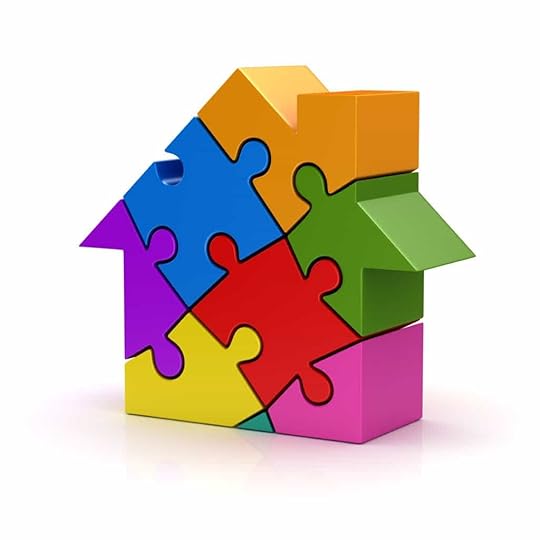Gea Elika's Blog, page 136
November 9, 2017
NYC Real Estate Trends

It sometimes seems like real estate trends in New York City are in a perpetual bull market. Prices keep rising and people keep buying. Hot neighborhoods keep getting hotter, and investments continue to pour in. It’s just impossible to catch up. Here, we try to make sense of some of the biggest trends right now in New York City real estate.

Manhattan Apartments Reach Record Levels—Again
Apartments and co-ops in Manhattan have reached another all-time high in 2017 after reaching record levels in 2016 and in 2015. The total number of sales of Manhattan apartments rose 15 percent from last year. The average price of an apartment or co-op in Manhattan rose to $2.19 million. Demand from buyers appears to be the driving force behind these mid-level sales if you can call $2.19 million “mid-level.” Interest in new construction condominiums is also a big factor with units selling quickly as eager buyers snatch them up.
Median sales of luxury apartments in Manhattan, however, is down across the board, with prices dipping 4.8 percent to just shy of $6.5 million. Bidding wars and all-cash offers seem to be off the table for ultra-luxury apartments. This is leading to sluggish sales at the higher end of the pricing scale as buyers feel less pressure to make a quick purchase.
Brooklyn is Booming
Brooklyn has seen, by far, some of the biggest population increases in all of New York in recent years. This growth has led to a building boom, with buyers grabbing properties almost as fast as they can be built. The average sales price for a home in Brooklyn is now nearly $1 million. Luxury real estate developments are driving the price higher and low inventory is keeping the market hot. Tourism, universities, and an undeniable “cool” factor have kept people flocking to Brooklyn. With underutilized properties just waiting to be converted, it seems like this trend will continue for quite some time.
The Bronx Sees Record Investment
When you think of real estate trends, you don’t often think of the Bronx. While Manhattan and Brooklyn hold the crown in price spikes, the Bronx is quickly being developed, with more affordable housing in mind. The borough has seen $3.3 billion in real estate development in the last year alone. That’s a 37 percent increase over last year, with a lot of exciting new developments in the works. Residential and mixed-use spaces are growing as demand grows for affordable housing in the city.
While pricing in New York City continues to fluctuate, it seems to be on a decidedly uphill trend. While ultra-luxury homes have taken a hit in Manhattan, the median price continues to rise. Brooklyn is seeing increases across all levels. The Bronx is receiving major investments in new residential construction. New York continues to grow as builders continue to invest and buyers search for their perfect home.
The post NYC Real Estate Trends appeared first on - Elika Real Estate.
Things to Consider Before Buying an Older Home in Los Angeles

The Golden Age of Hollywood spanned from the 1910s to the 1960s. With it, we saw the rise of the film industry, stars were born, and many homes were built. Older homes in Los Angeles tend to be unique, stylish, and beautiful. Craftsman, Victorian, modern homes and more can be found all throughout Los Angeles. The diversity of homes in LA is truly astounding. While many have stood the test of time, others could certainly use a facelift. Even if it’s not a fixer-upper, there are a few things to consider when purchasing an older home in Los Angeles.

Materials Used to Build Older Homes
Even if the plumbing, electrical, and other necessities have all been upgraded in a home, there is still a good chance the materials used to build the home are outdated. Drywall, for example, didn’t even exist until the 1960s. If you’re buying a house built in the 1950s, there’s a good chance it was made with horsehair plaster. That’s plaster mixed with the hair of a horse as a binding agent. It involves a different care process and you may want to consider having new drywall installed in its place.
Nothing is Standard
Before the 1980s, everything from floor and ceiling tiles to insulation and siding could have been made out of asbestos. Standards, like stud spacing, also didn’t exist back then. That may sound like a minor point, but if you’re wall-mounting your new 60” flat screen TV, it definitely falls under the category of “concerning.” Electrical boxes may be outdated. Outlets may be in odd places. To the adventurous, these give the home personality, but to others, they can be a royal pain.
Repairs are More Frequent
When buying any home, you’re going to have it inspected. This process can reveal major issues and give you a good idea of what big things need to be done — and how much they’ll cost. Due to the nature of older homes, however, be prepared for things to go wrong more frequently than with a new build. Mold or mildew can build up from moisture. You may have foundation or structural issues over time. The cost of maintaining an older home can be much higher than that of new construction.
Similarly, outdated insulation, drafty windows, and small cracks can lead to higher electrical costs. Green living was not a term used until just a few years ago. Materials used to lower electric bills, conserve water, and cool or warm the house did not yet exist. Your utilities will likely be higher in an older home for this reason unless it has been modernized by previous owners.
Owning an Older Home Means Owning Something Unique
Older homes can come with many challenges, but they also come with an opportunity to make something uniquely yours. When looking for an older home, you need to look at the opportunity — not just what it is but what it can be. It will surely be more labor-intensive, but the process can be a labor of love. Live in an older home and it will reveal its personality to you. Sometimes it can be frustrating, but it’s also what makes your home unique. The quirkiness of older homes is what makes them lovable. Like the saying goes, “they don’t build ‘em like they used to.”
The post Things to Consider Before Buying an Older Home in Los Angeles appeared first on - Elika Real Estate.
November 8, 2017
Small Ways to Contribute to Your NYC Neighborhood in a Big Way

“It’s a beautiful day in this neighborhood, a beautiful day to be neighbors,” starts the theme song to the popular television show “Mister Rogers.” It may seem silly in this fast-paced, hectic world we live in to consider what it means—what it really means—to be a neighborhood. But when Mister Rogers sings “would you be mine?” he’s asking you to make a social contract, a promise to contribute to the people around you and to the neighborhood itself. Being a good neighbor means contributing in a meaningful way, however small. There are many things you can do that don’t take a lot of time or money but still help in a big way.
Shop in Your Neighborhood
There is nothing inherently wrong with shopping at Whole Foods, Starbucks, Walgreens or Amazon.com. However, there is something very right about shopping at independent businesses in your neighborhood. National chains offer consistency in taste and experience, but New York offers a variety of local stores that are just as good—if not better—than the big box alternatives. One of the best ways to contribute to your neighborhood is to keep money local. A dollar spent in Brooklyn is a dollar kept in Brooklyn. Instead of exporting your hard earned cash by spending with a company headquartered in some far off city, spend it with one owned and operated by someone who lives down the street.
Coffee shops are an easy example of this. Sure, that pumpkin spice latte is delicious, but excellent local coffee shops are on almost every block in New York. Pharmacies are also everywhere in the city. Independent and regional grocery stores, food trucks, and local restaurants that have been around for decades are all great ways to support local business when spending your money.
Volunteer Locally
New York City parks are beautiful, but at the same time, they require a lot of upkeep. If you want to do some good in your neighborhood without having to dedicate a ton of money, volunteer to help keep your neighborhood park clean. Whether it’s raking leaves in the fall or painting park benches in the spring, spend an afternoon helping to make the area beautiful. Better yet, make a date of it and bring a friend. You both can enjoy a mimosa at your new favorite brunch spot afterward.
If an entire afternoon is too much of a commitment, try cleaning the sidewalk in front of your building. Picking up trash on your block can make your street look great, but it also keeps that trash from potentially polluting nearby streams and other waterways.
Donate Locally
There are charities everywhere to which you can donate money. Consider keeping those donations in the city. Every year, New York Magazine lists their top picks for charities within the city. City Meals on Wheels delivers meals to thousands of elderly people within the five boroughs. And for 25 years, Art Start has been conducting creativity workshops for at-risk kids throughout New York City. There are a lot of worthy causes out there. Find one that speaks to you.
The post Small Ways to Contribute to Your NYC Neighborhood in a Big Way appeared first on - Elika Real Estate.
Understanding Homeowners Association Duties in Los Angeles

Homeowners associations may seem like a fact of life in Los Angeles. In fact, 25% of all homeowners fall under the purview of an HOA. That means that if you’re considering purchasing a home in LA, there is a one in four chance that you’ll be governed by a homeowners association. With odds like that, it’s a good idea to understand what their duties are and how an HOA can affect your life and your home.
Roles and duties of a homeowners association in Los Angeles vary based on covenants and bylaws, but there are some basics that are worth understanding. Homeowners associations in California, and throughout Los Angeles, are typically corporations. These corporations, sometimes nonprofit, are established to set guidelines within the community they govern. They also collect dues from residents that are used for maintaining common areas such as pool, parks, and lobbies within the community.
California Laws Governing Homeowners Associations
Before 1985, homeowners associations were governed by a large swath of laws that nearly spanned the entirety of California code. That year, however, the Davis Stirling Common Interest Development Act (The Davis Stirling Act) was passed to bring together the laws governing HOAs. The Corporations Code for NonProfit Mutual Benefit Corporations also covers homeowners associations if they’re incorporated. The Attorney General may be able to assist in resolving complaints, but only in limited circumstances.
Adhering to California State Law
The board of your homeowner’s association should be well versed in Davis Stirling as well as in-laws governing the common areas that they manage. It may seem like all they do is make sure the grass is cut, but they also have to maintain and repair all common areas. This may seem trivial but, in a condo, for instance, it is a good idea to make sure they know how often the elevators need to be inspected. Homeowners associations don’t just exist to make sure your door is the correct color.
Maintaining Common Areas
The most impactful duty of a homeowners association is maintaining the common areas. This means making sure the windows are clean, the carpets are vacuumed, lights are changed, and the lawn is mowed. Your homeowner’s association should have a comprehensive list of their particular duties and how they relate to you. This is the best way to make sure that you’re getting what you’re paying for. Be sure to review their responsibilities before purchasing your new home.
Collecting and Dispersing Dues
Maintaining common areas obviously, comes at a price. Landscapers, window cleaners, and elevator maintenance companies will need to be hired as needed. Before you move into a new home governed by a homeowners association, make sure you know how much your fee will be and where that money goes.
Enforcing Bylaws
This is where most homeowners associations get a bad rep. Everyone knows at least one horror story of a homeowner terrorized by some group that forced them to repaint the house because it was the wrong shade of tan. Or, in a more recent example, being threatened with legal action in California because the homeowner wanted to conserve water. It’s a good idea to talk with the homeowners association, get a copy of the bylaws, and find out if you share the same values. You’ll thank yourself.
The post Understanding Homeowners Association Duties in Los Angeles appeared first on - Elika Real Estate.
November 7, 2017
Avoiding Rookie Home Buyer Mistakes

There are many advantages to owning your own home. Owning allows you to take advantage of tax breaks that will enable you to deduct mortgage interest, property taxes, and other costs involved in buying and maintaining a home. It also enables to build wealth as your home appreciates in value.
With any complicated activity that involves finances and various levels of bureaucracy, the margin of error can be rather slim. Real estate is no exception, and there are many mistakes to be made when you’re buying your first home. Watch out for these common mistakes:
28 Rookie Homebuyer Mistakes
1. Assuming you won't get approved for a mortgage.
2. Not checking your credit score.
3. Not budgeting and saving enough money for your first home loan.
4. Not calculating for closing costs and hidden or unexpected costs.
5. Not understanding local and macro housing trends.
6. Not checking the cost of homeowners insurance.
7. Not getting pre-approval from two lenders before you begin your home search.
8. Although it may be tempting, buying the best house on the block is never recommended.
9. Not researching the neighborhoods of interest.
10. Thinking you will get everything on your wish list.
11. Succumbing to “decision paralysis” and losing your dream home to another buyer.
12. Buying too much home or not enough of a home.
13. Not consulting a reputable contractor for the cost of renovations or repairs if needed.
14. Not hiring a home inspector prior to signing a contract.
15. Applying with only one lender and missing a great deal by not shopping around for the best mortgage.
16. Going directly to the listing agent who is hired by and represents the seller.
17. Ignoring the resale potential of the property.
18. Buying a home that is not worth buying, a buyers agent can help choosing the wrong property.
19. Representing yourself and forfeiting the help and guidance of an exclusive buyer’s agent.
20. Being emotionally tied to a home, falling in love can break your heart.
21. Being unfamiliar with what makes an offer attractive to a seller.
22. Estimating a properties fair value, an experienced buyers agent can be very helpful in this regard.
23. Not hiring an experienced local real estate attorney.
24. Submitting an incomplete oral offer instead of in writing with all contingencies if any.
25. Trusting a verbal agreement when buying.
26. Waiving mortgage or valuation contingencies without understanding the ramifications.
27. Not reading the house rules of a Condo or Coop before signing.
28. Not conducting a thorough final walkthrough of the property day of closing.
Happy Hunting!
The post Avoiding Rookie Home Buyer Mistakes appeared first on - Elika Real Estate.
Avoiding Rookie Homebuyer Mistakes

There are many advantages to owning your own home. Owning allows you to take advantage of tax breaks that will enable you to deduct mortgage interest, property taxes, and other costs involved in buying and maintaining a home. It also enables to build wealth as your home appreciates in value.
With any complicated activity that involves finances and various levels of bureaucracy, the margin of error can be rather slim. Real estate is no exception, and there are many mistakes to be made when you’re buying your first home. Watch out for these common mistakes:
28 Rookie Homebuyer Mistakes
1. Assuming you won't get approved for a mortgage.
2. Not checking your credit score.
3. Not budgeting and saving enough money for your first home loan.
4. Not calculating for closing costs and hidden or unexpected costs.
5. Not understanding local and macro housing trends.
6. Not checking the cost of homeowners insurance.
7. Not getting pre-approval from two lenders before you begin your home search.
8. Although it may be tempting, buying the best house on the block is never recommended.
9. Not researching the neighborhoods of interest.
10. Thinking you will get everything on your wish list.
11. Succumbing to “decision paralysis” and losing your dream home to another buyer.
12. Buying too much home or not enough of a home.
13. Not consulting a reputable contractor for the cost of renovations or repairs if needed.
14. Not hiring a home inspector prior to signing a contract.
15. Applying with only one lender and missing a great deal by not shopping around for the best mortgage.
16. Going directly to the listing agent who is hired by and represents the seller.
17. Ignoring the resale potential of the property.
18. Buying a home that is not worth buying, a buyers agent can help choosing the wrong property.
19. Representing yourself and forfeiting the help and guidance of an exclusive buyer’s agent.
20. Being emotionally tied to a home, falling in love can break your heart.
21. Being unfamiliar with what makes an offer attractive to a seller.
22. Estimating a properties fair value, an experienced buyers agent can be very helpful in this regard.
23. Not hiring an experienced local real estate attorney.
24. Submitting an incomplete oral offer instead of in writing with all contingencies if any.
25. Trusting a verbal agreement when buying.
26. Waiving mortgage or valuation contingencies without understanding the ramifications.
27. Not reading the house rules of a Condo or Coop before signing.
28. Not conducting a thorough final walkthrough of the property day of closing.
Happy Hunting!
The post Avoiding Rookie Homebuyer Mistakes appeared first on - Elika Real Estate.
November 6, 2017
What You Need to Know About Homeownership Costs in L.A.

Homeownership costs can initially be deceiving, especially for a first time homebuyer. When you pay rent, it actually covers a whole slew of costs for your landlord that you may not fully comprehend. Additional costs when renting will, of course, include utilities, and if you’re forward thinking renters insurance. Owning a home, however, includes additional costs and fees you might not be aware of.
In the long run, it’s typically cheaper to buy a house than to rent. You just have to be ready and prepared. Understanding monthly and annual costs of owning a home will make sure you don’t purchase one beyond your means—helping to keep your stress levels low.
Repair Costs
The first hidden costs when going from renting to buying are going to be repair costs. You may not miss sending a check to your landlord every month, but you’re probably going to miss him when your water heater fails. Unfortunately, when owning a home, you’ll not only be liable for all repair costs, but you also have to arrange to have those repairs made.
That can mean finding your own electrician, plumber, or handyman when things go wrong. Depending on the repair needed, the cost could be minuscule or quite expensive. A good rule of thumb, since many repairs are unforeseen, is to set aside 1 percent of the value of your home each year for repair costs. For added safety and assurance, you may want to consider a home warranty that covers things your homeowner’s insurance does not.
Homeowners Insurance in Los Angeles
Speaking of which, homeowners insurance is another expense you can expect as a homeowner. Homeowners insurance can range anywhere from $300 to $1,000 per year or more. In Los Angeles, you should bet on it being on the higher side since housing prices are more than three times the national average. While homeowners insurance is not required by law, it is likely a requirement of your bank for your mortgage.
Property Taxes in Los Angeles
Property taxes vary from city to city within the county of Los Angeles. There is an initial tax of 1 percent, but municipalities add their own taxes on top of that. While the average property tax in Los Angeles is 1.5 percent, it has gone as high as 1.55 percent of the value of your home in some cities.
Interest Rates
When you pay your mortgage, a large portion of that amount (especially in the beginning years) goes towards interest accumulating on the loan. Mortgage rates are currently at historic lows, but that doesn’t mean you won’t notice. Currently, the average interest rate for a 15-year mortgage is 3.5 percent. The average for a 30-year mortgage is around 4 percent.
All of these costs and fees add up, so it’s important to consider them in their totality when deciding how much house to buy. It can be the difference between sweating your bills every month and going out for a nice dinner—or maybe even save a little extra.
The post What You Need to Know About Homeownership Costs in L.A. appeared first on - Elika Real Estate.
November 5, 2017
Truth or Myth: Do Celebrities make Real Estate Profits because they owned it?

There are a lot of myths in the real estate world, and it can be tricky to sort fact from fiction. Welcome to Truth or Myth, where we look at the most common real estate myths, legends, and adages to see if there’s anything there.
Today, we’re asking: are celebrities real estate geniuses?
The Myth
This myth essentially argues that celebrities have a knack for real estate. Maybe it’s because they tend to be connected, so they find out about deals early and can get in on them. Perhaps it’s because they’re immersed in pop culture, so they’ve got a good sense of the next big neighborhood to blow up. Maybe it’s that they use their star power (not to mention years of negotiating experience) to get a steal of a deal when they buy.
Whatever the reason (so the myth goes) celebrities are amazing at buying real estate.
The Evidence
We put our crack myth investigation team on it and found out, no, this myth is NOT true.
Yes, some lucky celebrities have made wise real estate investment decisions that ultimately paid off.
Image by David Shankbone / Flickr
Ashton Kutcher, for example, bought a home in the Hollywood Hills in 2004, renovated it, and listed it in 2011 for x2.5 times the purchase price. Likewise, Uma Thurman sold her property in Greenwich Village for a $2.5 million profit, and Dennis Quaid listed what amounts to an equestrian ranch for a little over $15 million in 2011 that he purchased for $1.8 million in 1999.
However, that’s hardly a basis to assume all celebrities are amazing at real estate investment, or that being a celebrity makes you better.
Because just as there are examples of celebrities who have achieved superb results with their homeownership…
… there are also celebrities who have crashed and burned.
Katy Perry, for instance, purchased a home in 2011 for $6.5 million that she was going to share with her then-husband, Russell Brand. But they broke up, and she was forced to sell for only $5.6 million.

Image by YayA Lee / Flickr
Likewise, Christina Aguilera sold the Osbourne’s mansion in for $11.5 million after two years on the market – which is exactly what she paid for it when she bought it.
And of course, there’s the mother of all celebrity housing missteps. Michael Jordan has been trying to sell his 32,000 square foot home for over five years now. Since purchasing it, he’s made significant renovations, including the installation of a basketball court (of course). He initially listed it at $29 million but has since chipped away at the price until now, when it sits just under $15 million. It’s still for sale.
Conclusion
so what does this mean?
Well, it means that celebrities are just like us.
Yes, some of them have an eye for real estate and can make a killing. Others are terrible and lose vast sums of money.
And in the middle is most of them. There are countless stories of celebrities making or losing a comparatively small amount of money on the property when they want to move quickly after a breakup or just happen to be in the right place at the right time.
But it looks like star power doesn’t have much to do with it.
Image by Cristee Dickson / Flickr
Even Jennifer Aniston who, after buying for $21 million and selling for around double that, isn’t a real estate pro because of her A-Lister status. She renovated a prime-location mansion in a strong market and in a creative, exciting way. Her house was featured in architecture magazines when it was finished. Of course, it sold for a big chunk of change!
All in all, the only difference between the stars and the rest of us when it comes to real estate is the sums involved. While most of us would balk at the thought of losing $100,000 on a property deal.
That’s not such a problem when you’re cranking out movies for $10 million a pop.
The post Truth or Myth: Do Celebrities make Real Estate Profits because they owned it? appeared first on - Elika Real Estate.
November 4, 2017
How to Navigate Final Walkthroughs in LA Homes

A final walkthrough when buying a home in Los Angeles is your last chance to make sure everything is perfect before you close on your new home. Final walkthroughs are usually done the day of, or the day before, closing on the house. Ideally, it’s done once the current occupants have moved out so you can see exactly what you’re getting. It’s also your last chance to make sure there are no problems before you take ownership of the home. While a final walkthrough is not required by law, there are enough horror stories to convince you that you should not skip this important step.

A final walkthrough is not an inspection, but it is a chance for you to make sure everything is how it should be. When going through an inspection, especially once the homeowners have moved out, you can make sure that any appliances that were supposed to be there are still in the home. You can also check for any damage that may have been hidden by furniture or other items, and make sure that the home was not damaged when the previous occupants moved out.
What You Should Look for During a Final Walkthrough
It’s a good idea to do a final walkthrough before the day you close on your new home. If issues do come up, you’ll want some time for things to be fixed or repaired before you actually purchase the house. Scheduling the walkthrough a few days in advance can give you the time you might need should issues arise.
Hopefully, any issues will be minor and easily addressed. Things that you’ll notice quickly during a walk through are trash or belongings that may have been left behind by the previous owners. You may find out that the walls are not in great shape and need to be spackled or painted. You’ll also want to look for any damage that may have been caused by the movers. These are things that can usually be addressed quickly and easily before you begin your own moving process.
What Happens When You Discover A Larger Problem
Almost 100 percent of the time, a final walkthrough is merely a formality. It’s the last glance to give you peace of mind and to make sure your move-in goes smoothly. However, from time to time there are reports of buyers finding extensive water damage or leaks. You may discover that the homeowners took the appliances with them even though you agreed that those items would stay. If you see a larger issue that needs to be addressed, it’s important not to panic. Whatever the issue, discuss them with your Realtor.
If the problem is large enough, your Realtor can negotiate to adjust your contract to insist on money off of the price of your new home. In some instances, it may make sense for you to ask for cash to fix the problem. The seller is likely willing to work with you if the problem was previously unknown but severe. It’s important to talk it through and agree on an arrangement that works for everyone. And remember, if all else fails, you haven’t bought the home yet.
Final Walkthrough Check-List
Have all repairs requested been made?
Were all changes/fixes made pursuant to the sales contract?YesNo
Has warranty documentation for the repairs been provided?YesNo
Check all appliances and systems, Do they all work?YesNo
DishwasherYesNo
HeatingYesNo
Air conditionerYesNo
ThermostatsYesNo
Ceiling fansYesNo
Hot/cold water on all faucetsYesNo
Refrigerator/freezerYesNo
MicrowaveYesNo
All stove burners and ovenYesNo
Garbage disposalYesNo
Washing machine and dryerYesNo
Electrical outletsYesNo
Overhead Lighting and SconcesYesNo
Smoke detectorsYesNo
Garage doorYesNo
DoorbellYesNo
Alarm SystemYesNo
All remotes or keypadsYesNo
Plumbing Check
Do all toilets flush?YesNo
Do all sinks fill and drain properly?YesNo
Do all bathtubs fill and drain properly?YesNo
In case of a jacuzzi do all jets work?YesNo
Do all showers drain properly?YesNo
Windows and doors
Do all windows and doors open and lock properly?YesNo
Are any windows broken?YesNo
Mold Check
Do windows have mold?YesNo
Check under sinks for mold or water damageYesNo
Check showers for mold or water damageYesNo
Check toilets for mold or water damageYesNo
Exterior of the property
Is there any change or damage to the roof and siding on the exterior?YesNo
If there is an irrigation system, is it working properly, are there any leaks?YesNo
Check outdoor lights and electrical outlets, do they work?YesNo
Check railings, decks, and stairs are they sturdy?YesNo
Is the landscaping the same as when the contract was signed?YesNo
Cleanliness Check
Has all garbage been removed from the home?YesNo
Yes No Is the home clean?YesNo
The post How to Navigate Final Walkthroughs in LA Homes appeared first on - Elika Real Estate.
November 3, 2017
Planning to Buy a Home? Get Your Finances in Order

Getting your finances in order is perhaps the most important thing you can do prior to beginning your search for a home. After all, finding the perfect home will be futile if your finances are in disarray. As such, here are some things you can do to get them sorted:

1. Track your Bills
Track your bills and credit card receipts for three to six months, and develop a realistic budget based on what you are actually spending. Add in estimates for healthcare expenses and vehicle maintenance and repair.
2. Control your Debt
Pay down debt. Lenders want less than 30 percent of your income to be spent on loan repayment, including your mortgage. Your mortgage will typically be between 25 and 28 percent of your income, your total debt load should be about 8-10 percent of income.
3. Watch your Expenses
Watch your nickels and dimes. It’s easy to keep track of major expenses like rent and utilities, but it’s the little expenses that ruin a budget. Write down everything you spend for a month—you’ll discover quick ways to cut expenses.
4. Boost your income
Consider a part-time job or freelance work to boost your income so you can qualify for a higher mortgage.
5. Save
Start a savings plan just for your new house, and build monthly contributions into your budget. If your employer offers direct deposit, put your savings in the bank before you get your take-home pay.
6. Accumulate a 20% Down payment
Aim for saving a 20 percent down payment. While it’s possible to get a lower initial payment, your interest rate will be lower and you’ll avoid pricey mortgage insurance premiums.
7. Establish an Employment History
Build up a steady employment history. Most lenders want to see stable employment with two years on the job for best interest rates.
8. Monitor your Credit exposure
Use credit wisely to build your credit score. Pay your bill in full each month where possible, and never max out your credit limits
The post Planning to Buy a Home? Get Your Finances in Order appeared first on - Elika Real Estate.





